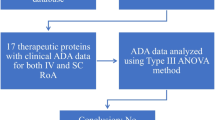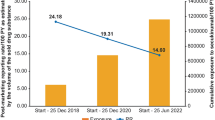Abstract
Vedolizumab (Entyvio™) is a humanized monoclonal antibody α4β7 integrin-receptor antagonist indicated for the treatment of adult patients with moderately to severely active ulcerative colitis or Crohn’s disease. This article reviews the pharmacological properties of intravenous infusions of vedolizumab and its clinical efficacy in adult patients with these diseases. In phase III clinical trials, patients with ulcerative colitis had significantly higher rates of clinical response and clinical remission when treated with vedolizumab than when receiving placebo at both 6 and 52 weeks. However, outcomes with vedolizumab in patients with Crohn’s disease were mixed. In a study that evaluated both clinical remission rate and CDAI-100 response rate as primary endpoints, only the clinical remission rate at 6 weeks was significantly higher with vedolizumab than placebo. In another trial, there was no significant between-group difference in the clinical remission rate in TNF-antagonist failure patients at 6 weeks (primary endpoint), although there was a significant difference at 10 weeks. In the Crohn’s disease study that included maintenance treatment, vedolizumab was significantly more effective at 52 weeks than placebo in both endpoints (clinical remission was the only primary endpoint in the maintenance study). Vedolizumab was generally well tolerated in these trials. As vedolizumab is a specific α4β7 integrin antagonist, with gut-specific effects, it is unlikely to be associated with the development of progressive multifocal leukoencephalopathy, a risk observed with the less selective α4β7/α4β1 integrin antagonist natalizumab. Vedolizumab is a useful addition to the treatment options available for patients with moderately to severely active ulcerative colitis and Crohn’s disease.



Similar content being viewed by others
References
Mosli M, Rivera-Nieves J, Feagan B. T-cell trafficking and anti-adhesion strategies in inflammatory bowel disease: current and future prospects. Drugs. 2014;74(3):297–311.
Allen PB, Peyrin-Biroulet L. Moving towards disease modification in inflammatory bowel disease therapy. Curr Opin Gastroenterol. 2013;29(4):397–404.
Cheng FK, McLean LP, Cross RK. What is the role of vedolizumab in the era of anti-TNF agents? Ann Transl Med. 2014. doi:10.3978/j:issn.2305-5839.2013.10.01.
European Medicines Agency. Entyvio® (vedolizumab for intravenous infusion): EU summary of product characteristics. 2014. http://www.ema.europa.eu/docs/en_GB/document_library/EPAR_-_Product_Information/human/002782/WC500168528.pdf. Accessed 28 Oct 2014.
Takeda Pharmaceuticals America Inc. Entyvio® (vedolizumab for intravenous infusion): US prescribing information. 2014. http://general.takedapharm.com/content/file.aspx?filetypecode=ENTYVIOPI&CountryCode=US&LanguageCode=EN. Accessed 28 Oct 2014.
Soler D, Chapman T, Yang LL, et al. The binding specificity and selective antagonism of vedolizumab, an anti-alpha4beta7 integrin therapeutic antibody in development for inflammatory bowel diseases. J Pharmacol Exp Ther. 2009;330(3):864–75.
Haanstra KG, Hofman SO, Lopes Estevao DM et al. Antagonizing the alpha4beta1 integrin, but not alpha4beta7, inhibits leukocytic infiltration of the central nervous system in rhesus monkey experimental autoimmune encephalomyelitis. J Immunol. 2013;190(5):1961–73.
Milch C, Wyant T, Xu J, et al. Vedolizumab, a monoclonal antibody to the gut homing α4β7 integrin, does not affect cerebrospinal fluid T-lymphocyte immunophenotype. J Neuroimmunol. 2013;264(1–2):123–6.
Fedyk ER, Wyant T, Yang LL, et al. Exclusive antagonism of the alpha4 beta7 integrin by vedolizumab confirms the gut-selectivity of this pathway in primates. Inflamm Bowel Dis. 2012;18(11):2107–19.
Rosario M, Fox I, Milch C, et al. Pharmacokinetic/pharmacodynamic relationship and immunogenicity of vedolizumab in adults with inflammatory bowel disease: additional results from GEMINI 1 and 2 [abstract no. P-140]. Inflamm Bowel Dis. 2013;19(Suppl. 1):S80.
Wyant T, Yang L, Fedyk E. In vitro assessment of the effects of vedolizumab binding on peripheral blood lymphocytes. Abs. 2013;5(6):842–50.
Parikh A, Wyant T, Clifford DB, et al. No increase in JC viremia, lymphocyte count, or circulating CD34+ hematopoietic progenitor cells after treatment with vedolizumab, a humanized monoclonal antibody to alpha4beta7 integrin [abstract no. 1008]. Gastroenterology. 2010;1:S145–6.
Wyant T, Leach T, Sankoh S, et al. Vedolizumab affects antibody responses to immunisation selectively in the gastrointestinal tract: randomised controlled trial results. Gut. 2014. doi:10.1136/gutjnl-2014-307127.
Dirks NL, Rosario M, Gastonguay MR et al. Population pharmacokinetic modeling of vedolizumab in patients with ulcerative colitis or Crohn’s disease [abstract no. Mo1225]. Gastroenterology. 2014;146(5 Suppl. 1):S591.
Feagan BG, Rutgeerts P, Sands BE, et al. Vedolizumab as induction and maintenance therapy for ulcerative colitis. N Engl J Med. 2013;369(8):699–710.
Sandborn WJ, Feagan BG, Rutgeerts P, et al. Vedolizumab as induction and maintenance therapy for Crohn’s disease. N Engl J Med. 2013;369(8):711–21.
French J, Rosario M, Dirks NL et al. Exposure-response relationship of vedolizumab treatment in adults with ulcerative colitis [abstract no. Mo1229]. Gastroenterology. 2014;146(5 Suppl. 1):S592.
French J, Rosario M, Dirks NL et al. Vedolizumab exposure-response relationship during induction therapy in adults with Crohn’s disease [abstract no. Mo1231]. Gastroenterology. 2014;146(5 Suppl. 1):S592–S3.
Parikh A, Leach T, Wyant T, et al. Vedolizumab for the treatment of active ulcerative colitis: a randomized controlled phase 2 dose-ranging study. Inflamm Bowel Dis. 2012;18(8):1470–9.
Parikh A, Fox I, Leach T, et al. Long-term clinical experience with vedolizumab in patients with inflammatory bowel disease. Inflamm Bowel Dis. 2013;19(8):1691–9.
Feagan BG, McDonald J, Greenberg G et al. An ascending dose trial of a humanized α4β7 antibody in ulcerative colitis (UC) [abstract no. 4851]. Gastroenterology. 2000;118(4 Suppl. 2):A874.
Feagan BG, Greenberg GR, Wild G, et al. Treatment of ulcerative colitis with a humanized antibody to the α4β7 integrin. N Engl J Med. 2005;352(24):2499–507.
Feagan BG, Greenberg GR, Wild G, et al. Treatment of active Crohn’s disease with MLN0002, a humanized antibody to the alpha4beta7 integrin. Clin Gastroenterol Hepatol. 2008;6(12):1370–7.
Sands BE, Feagan BG, Rutgeerts P et al. Effects of vedolizumab induction therapy for patients with Crohn’s disease in whom tumor necrosis factor antagonist treatment failed. Gastroenterology. 2014;147(3):618–27 e3.
Feagan B, Colombel JF, Rubin D, et al. Improvements in health-related quality of life in patients with ulcerative colitis treated with vedolizumab [abstract no. DOP076]. J Crohns Colitis. 2014;8:S51–2.
Feagan B, Sandborn WJ, Smyth M, et al. Effects of continued vedolizumab therapy for ulcerative colitis in week 6 induction therapy nonresponders [abstract no. P501]. J Crohns Colitis. 2014;8:S276–7.
Sandborn WJ, Feagan B, Reinisch W et al. Efficacy of continued vedolizumab therapy in patients with Crohn’s disease who did not respond to vedolizumab induction therapy at week 6 [abstract no. P497]. J Crohns Colitis. 2014;8(Suppl. 1):S274–S5.
Colombel JF, Sands B, Hanauer S, et al. Long-term safety of vedolizumab for the treatment of ulcerative colitis or crohn’s disease [abstract no. 1674]. Am J Gastroenterol. 2013;108:S502–3.
Disclosure
The preparation of this review was not supported by any external funding. During the peer review process, the manufacturer of the agent under review was offered an opportunity to comment on this article. Changes resulting from comments received were made by the author on the basis of scientific and editorial merit. Karly Garnock-Jones is a salaried employee of Adis/Springer.
Author information
Authors and Affiliations
Corresponding author
Additional information
The manuscript was reviewed by: M.H. Mosli, Robarts Research Institute, Western University, London, Ontario, Canada; R. Caviglia, Department of Digestive Diseases, Campus Bio-Medico University of Rome, Rome, Italy.
Rights and permissions
About this article
Cite this article
Garnock-Jones, K.P. Vedolizumab: A Review of Its Use in Adult Patients with Moderately to Severely Active Ulcerative Colitis or Crohn’s Disease. BioDrugs 29, 57–67 (2015). https://doi.org/10.1007/s40259-014-0113-2
Published:
Issue Date:
DOI: https://doi.org/10.1007/s40259-014-0113-2




